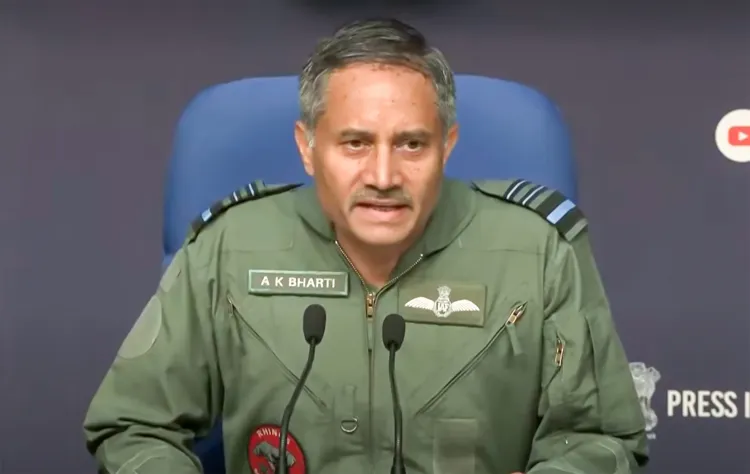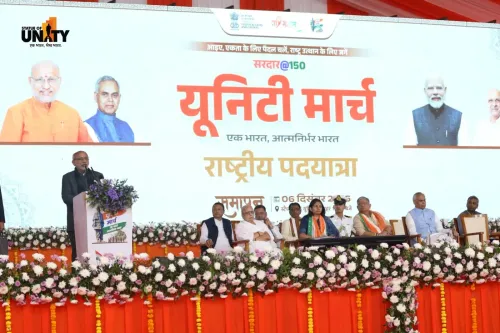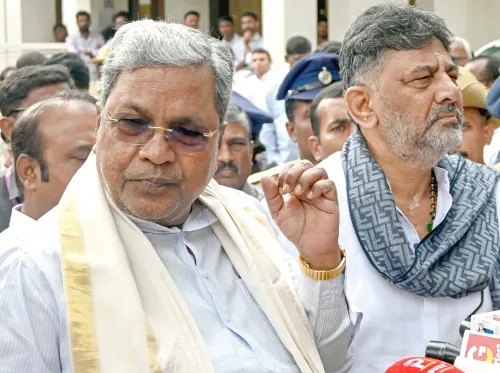Is Pakistan's Portrayal of Hafiz Abdur Rauf as a 'Family Man' an Attempt to Mislead?

Synopsis
Key Takeaways
- India dismisses Pakistan's disinformation regarding Operation Sindoor.
- Hafiz Abdur Rauf is highlighted as a US-designated terrorist.
- Evidence suggests state support for terrorism in Pakistan.
- Operation Sindoor was characterized as a counter-terrorism effort.
- India emphasizes the importance of transparency and accountability in reporting on terrorism.
New Delhi, May 12 (NationPress) India categorically rejected Pakistan's efforts to twist the narrative surrounding the consequences of Operation Sindoor, describing it as a predictable disinformation campaign designed to deceive its citizens and minimize the significant damage caused by Indian operations targeting terrorist infrastructure in both Pakistan and Pakistan-occupied Kashmir (PoK).
This assertion was made during a press briefing by the Director General of Military Operations (DGMO) in New Delhi, addressing inquiries regarding Pakistan's portrayal of the funeral for terrorists killed in the operation.
"Naturally, such reactions are anticipated, and they will resort to any means to calm their populace and downplay the information regarding the damage sustained," stated Air Marshal A.K. Bharti, Director General of Air Operations.
He further remarked, "What propaganda the other side is attempting to create is a narrative for them to respond to, not a military query for us. We have accomplished our mission."
One of Pakistan's tactics to obfuscate facts involves merging two distinct individuals: Hafiz Abdur Rauf, a US-designated terrorist and operative of Lashkar-e-Taiba (LeT), and Abdul Rauf Azhar, a senior commander of Jaish-e-Mohammed (JeM) reportedly killed in the Indian airstrikes.
Pakistani officials have claimed that Abdur Rauf, who led the funeral procession for the deceased terrorists in Muridke, was simply "a common family man."
During a recent press conference, Indian officials showcased photographic evidence of Rauf leading the funeral prayers, attended by high-ranking Pakistani military officials with coffins draped in the national flag, visually confirming what New Delhi termed as Pakistan's institutional backing for terrorism.
Abdur Rauf, who is the sibling of JeM chief Masood Azhar, has been recognized as a global terrorist by the US Treasury since 2010. His Pakistani national ID (CNIC 35202-5400413-9, birthdate March 25, 1973) aligns with the details listed in the OFAC sanctions.
He has been instrumental in LeT's fundraising and training initiatives and has been heavily involved with the Falah-e-Insaniyat Foundation (FIF), a front group for LeT masquerading as a charity.
Conversely, Abdul Rauf Azhar is JeM's operational commander linked to major attacks, including the 1999 IC-814 hijacking, the 2001 Parliament attack, the 2016 Pathankot airbase attack, and the 2019 Pulwama bombing. Indian sources assert he was neutralized during Operation Sindoor.
"The presence of army officers, Punjab police officials, and local lawmakers at the funeral of LeT terrorists paints a clear picture of state support," India stated.
Among those present were Lt Gen Fayyaz Hussain Shah, Maj Gen Rao Imran Sartaj, Brig Mohd Furqan Shabbir, IGP Dr Usman Anwar, and MLA Malik Sohaib Ahmed Bherth.
Referring to the visuals from Muridke, India emphasized that this was not a "private religious funeral" but a state-supported ceremony.
India's Foreign Secretary Vikram Misri also pointed out the hypocrisy, questioning, "If only civilians were killed, why were funerals led by UN-designated terrorists attended by Pakistan's top military officials?"
The aftermath of the funeral has sparked renewed global concern regarding Pakistan's ongoing support for designated terrorist organizations.
The Indian government reiterated that Operation Sindoor constituted a counter-terrorism strike, not a military offensive, and that it took deliberate measures to prevent civilian casualties.
India characterized Pakistan's counterclaims and efforts to depict terrorists as civilians as a desperate tactic to divert attention from the substantial evidence now publicly available.










